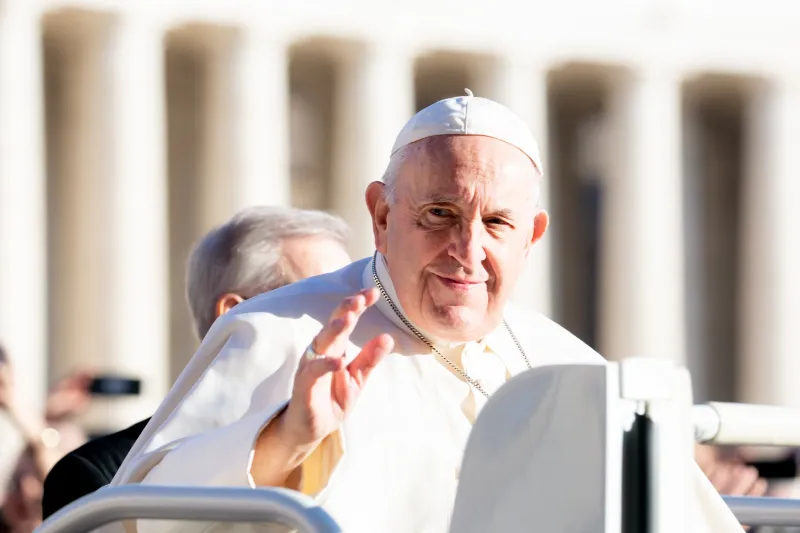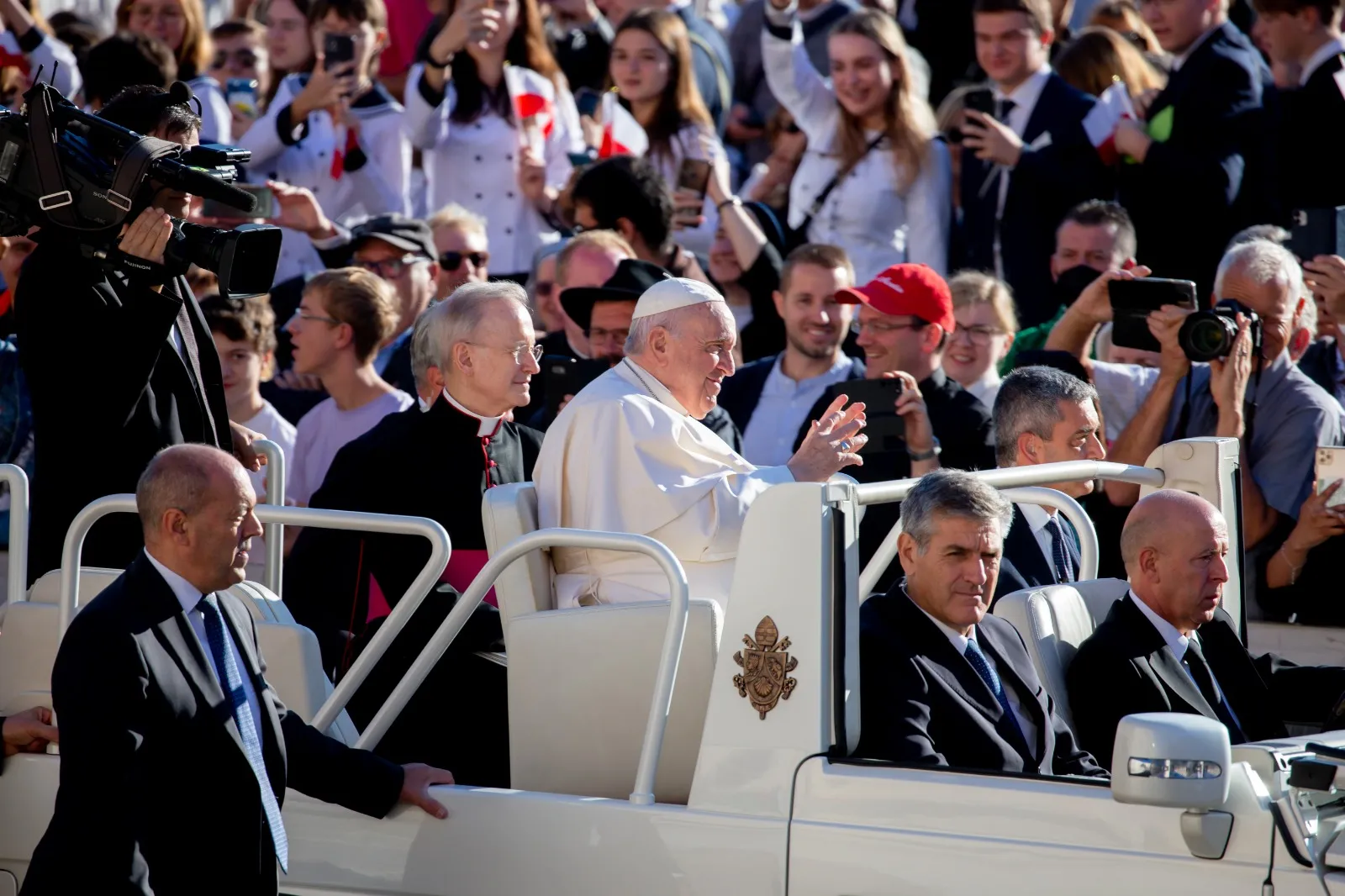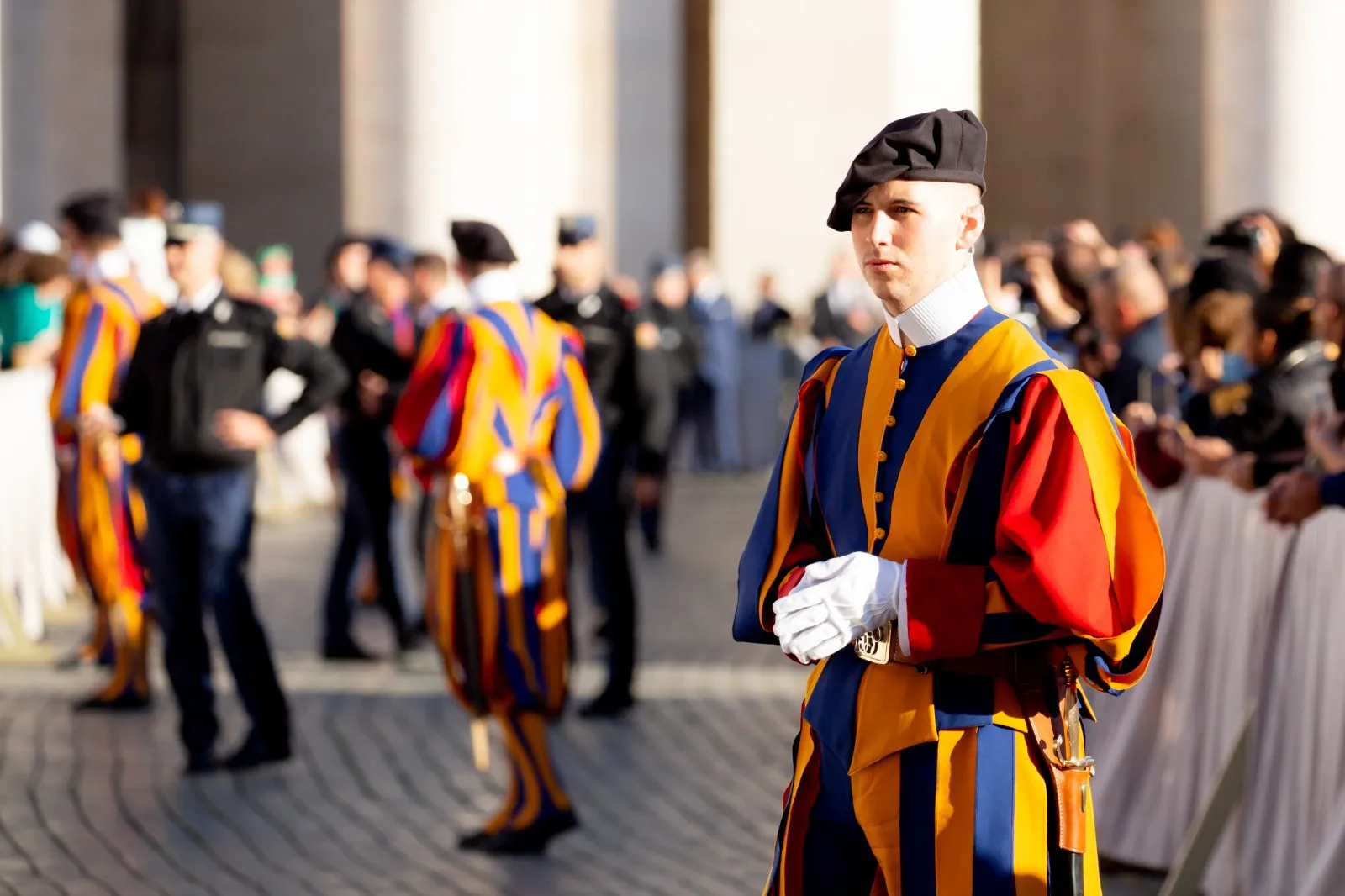
Fr. Benedict Croell, O.P., and Fr. Andrew Hofer, O.P., are co-authors of A Living Sacrifice: Guidance for Men Discerning Religious Life, recently published by Vianney Vocations.
Fr. Croell served as novice master for four years in Kenya and as vocation director for eight years for the Dominican Province of St. Joseph in Washington, DC. He presently heads the development and mission advancement office at the Pontifical University of St. Thomas Aquinas—the Angelicum in Rome. Fr. Hofer served in formation for eight years at the Dominican House of Studies in Washington, DC, after earning his doctorate in theology (specializing in patristics) from the University of Notre Dame. He continues to teach on the Pontifical Faculty at the Dominican House of Studies.
The two priests recently spoke with Catholic World Report about vocations, discernment, religious life, and the priesthood.
CWR: What is Vianney Vocations? How and why did they ask you write this book?
Fr. Hofer: Sam Alzheimer founded Vianney Vocations in 2009, and the organization has as a motto: “Renewing the Church by inspiring Priestly and Religious Vocations.” That’s their mission, and they are impressive in the number of services that they provide the Church. Among the books that they offer, Father Brett Brannen’s To Save a Thousand Souls: A Guide for Discerning a Vocation to the Diocesan Priesthood has been hugely popular, and is now available also in Spanish and French. More recently, they have a book for women’s religious life, written by Sr. Clare Matthiass, C.F.R., and it’s called Discerning Religious Life.
Sam turned to Father Benedict Croell, who last year finished eight years of outstanding service as a vocation director for the U.S. Eastern Dominican Province of St. Joseph, to write a book for men’s religious vocations. Because Father Benedict knew that I like to write and have some experience in vocation and formation work, he thought it would be good if the two of us collaborated on the project. We’re so thankful to God that we’re able to contribute this book that we hope will be very helpful to young men thinking about religious life—regardless of the particular community. The book is written by Dominican priests from the Province of St. Joseph, but we wrote this book constantly thinking about the breadth of the Church’s religious life.
Fr. Croell: In my eight years as vocation director for the Eastern Province Dominicans, I saw the materials produced by Vianney Vocations and grabbed a number of ideas for our own promotion of vocations to the Order of Preachers. In my conversations with Sam Alzheimer, the founder, I remember lamenting the fact that there was not a similar book of To Save a Thousand Souls (focused on the Diocesan vocation) for young men considering a vocation to Religious priesthood or brotherhood.
To my surprise, my last year serving as vocation director, Sam invited Fr. Andrew Hofer, OP, and me to co-author a book to fill that need and Living Sacrifice was the result. We are super excited that it is now out there to help young men and everyone to better understand the vocation to religious life for men. Fr. Andrew was the main formator for all of the men who entered formation during my years as vocation director, so we put our heads together and sorted out what we thought were the most pressing questions and issues that we saw for a man to enter and flourish in consecrated religious life. As Fr. Andrew said, we wanted specifically to write a book that would help men enter any of the various forms of religious life in the Church today—not just the Dominicans. I think both of us have a sense of responsibility to share what we saw given how blessed we have been during our years working with our young men—many of whom are now priests.
CWR: How did you each discern your vocation to the religious life? What are some key aspects of your background that helped in writing this book?
Fr. Hofer: I was blessed to have a sense of a religious vocation from a young age. Benedictines in Atchison, Kansas, where I went for my undergraduate education, were especially helpful to witnessing for me the great gift of religious life. In fact, both Father Benedict and I are very much indebted to Benedictines in our religious vocations. Because Father Benedict knew from his time in Conception, Missouri, the one who is now Abbot Primate of the Benedictine Confederation throughout the world, Abbot Primate Gregory Polan, O.S.B., Father Benedict asked him to write our book’s foreword. That’s a great honor for us! In our book, we make our own what St. Bernard of Clairvaux is said to have commented on the variety of religious orders in his day: “I admire them all. I belong to one of them by observance, but all of them by charity. We all need one another.” Because Father Benedict and I know so many religious who have helped us find our own religious vocations and who continue to sustain us in our vocations, we want our book to be of service to the great variety of men’s religious communities.
Fr. Croell: My vocation arose after the death of my mother, when the Lord gave me a rediscovery of the Faith after reading what we actually believe as Catholics. The discovery of what we believe about the Real Presence of Jesus in the Eucharist blew me away. Like most young men, coming from a Diocesan parish, I first thought about a vocation to become a priest … They sent me to study at Conception Abbey for my last years of college so I was privileged, like Fr. Andrew, to see the Benedictine Monks in action and I was thoroughly impressed. That experience opened many doors in understanding religious life as a real possibility. Now in Rome, here at the Angelicum, my former Scripture professor and rector from college seminary is now the Benedictine Abbot Primate for Benedictines throughout the world and just a short walk away on the Aventine Hill at Sant’Anselmo. I was able to personally ask him to write the forward for our book and he accepted!
CWR: What is the Big Picture approach of the book? What are some of essential steps or foundational issues addressed?
Fr. Hofer: The Big Picture is about God! A religious vocation is radically centered on God. I hope the book will help young men think more clearly about God and about divine providence in their lives.
Fr. Croell: Along with Fr. Andrew’s words, I would add: Think more about God and less about yourself, be generous, and consecrate the whole process (discernment) to Jesus through the hands of our Blessed Mother by praying the Rosary each day. If a young man does this, he won’t miss his vocation!
CWR: The book opens with chapters about ten truths to “set you free from discernment traps”. What are the main traps and obstacles that you see and address? What is a trap or problem that might be surprising or not immediately obvious?
Fr. Hofer: The word “discernment” is used in all sorts of ways today, and we want readers to think about how some ways “to discern” have traps. But the Truth sets us free. One trap is that someone may think if he has a girlfriend, he isn’t called to religious life. Or, if he doesn’t have a girlfriend, he should enter religious life. Religious life isn’t meant to be the second-best option. Many young men can find that God is calling them to receive a greater love, and give a greater love, by following Jesus Christ through the evangelical counsels of poverty, chastity, and obedience.
Fr. Croell: The word “discernment” conveys first the subject (the one discerning). We want men to reorient their thoughts towards God. We have to start with the Trinity. A number of men get stuck by thinking it is all about themselves, whereas it really is more about God. Men face any number of challenges in finding where the Lord is calling them, which we try to tackle in the book. We invite men to understand that the work of discernment of a vocation is not like solving a calculus equation. There are important steps but “in everything God works for good with those who love Him” (Rom. 8:28). Trust in the Lord and He will show you the way.
CWR: The book also presents ten things to do and not to do when considering religious life. What are some of those?
Fr. Hofer: The top thing to do is talk with God! The word vocation means in Latin “call.” God calls. Talk with him. As for what not to do, one example is this: don’t look at pornography. Pornography prepares a man for no vocation.
Fr. Croell: Exactly as Fr. Andrew said. The young man should storm heaven and have an expectant faith that he will see how the Lord is helping him.
CWR: Part Two of the book dives into the theological foundations of “the Trinitarian call”. How does having a deep theological understanding of the religious vocation shape the discernment process?
Fr. Hofer: Being a religious is having an intense experience of our baptismal consecration in the Name of the Father, and of the Son, and of the Holy Spirit. Many religious men receive the sacrament of Holy Orders, but religious profession is not its own sacrament. It’s intimately linked with our basic Christian identity. A young man serious in his Catholic faith is called to grow in faith, hope, and love, the theological virtues that unite him in a special way to God. By having a greater appreciation for the mystery of the Most Holy Trinity at work in his life, a young man may find the joy of giving up the things of the world so as to live radically for God alone: moved by the Holy Spirit to follow Jesus to the Father. Religious life may very well provide the opportunity for that man to have his whole life dedicated to the worship of God.
Fr. Croell: Fr. Andrew said it all! Religious life is a tried and proven way to be configured to the Holy Trinity and to become a saint. Many religious communities have older brothers and sisters who have shown that it works.
CWR: You talk about how it is natural for a man to be attracted to women and to be aware of his sexual desires. In a culture so saturated with sexual images and false notions about sexuality, how difficult and necessary is it for men to address possible problems in these areas? What about men who struggle with same-sex attractions?
Fr. Hofer: Generally speaking, young men know all too well not only sexual desires, which would be natural to have, but also the sexual confusion in the world. Young men thinking about religious life should express a healthy appreciation for marriage and a desire to give up the possibility of marriage for the sake of the Kingdom. As for same-sex attractions, in our book we cite the 2005 instruction from the Congregation for Catholic Education regarding persons with homosexual tendencies in seminary formation. That instruction pertains to priestly ordination, and so is relevant to both diocesan and religious priestly vocations, and it should be prudently applied regarding religious formation in general.
Fr. Croell: Pope St. John Paul II somewhere said, when I was a seminarian, how he learned to cherish marital love. A man considering a vocation should do the same and be ready to build up the Church in the area of marriage and family. The gift of our sexuality is many times confused within our culture—the confusion can certainly derail a man from finding his vocation, frustrating him and making him think it would never be possible to forego the good of wife and children. We give pretty strong recommendations in our book for a man to disconnect and to fill his mind and heart with what is good and true. A man should take the advice of a wise spiritual director in regard to the question of same-sex attraction.
CWR: You outline how different communities have different expectations, schedules, approaches, and so forth. What should men expect? And not expect?
Fr. Hofer: Regardless of the particular type of religious life, men should expect an experience of sharing in Christ’s sacrifice. The title of our book, A Living Sacrifice, is taken from Romans 12:1: “Brothers, I beg you through the mercy of God to offer your bodies as a living sacrifice, holy and acceptable to God, your spiritual worship.” A young man should not expect that he’ll be a different person when he enters religious life. Every religious community offers a formation, which is a type of change. A man with a religious vocation will be changed during formation to be more conformed to Christ, but he won’t become a different person.
Fr. Croell: We try in the book to encourage men to have sober expectations and judgments when learning and understanding different forms of religious life. It is true, the basics of religious life say a lot to a young man considering joining—but he should also not “go shopping” for a religious community. He should do some research first, and our book is a good place to start!
CWR: Is there anything else you’d like to say about the book and what you hope it accomplishes?
Fr. Hofer: We hope that many will give copies of this book to young men they want to encourage to consider religious life. Just by seriously thinking about religious life, young men can grow in their faith and become more intent on following Jesus wherever he goes. I pray that this book will assist many young men in the knowledge and confidence to avoid certain traps and problems and to be more focused on Jesus Christ. As St. Thomas Aquinas says, Jesus is our wisest and best friend. Jesus offers the joy of being with him through the evangelical counsels of poverty, chastity, and obedience. Just as a young man turns to an expert or friend to receive counsel about an important decision, so he can turn very confidently to Jesus Christ—the one who is most expert and who loves us completely–about what to do in life. I want this book to help readers listen to him.
Fr. Croell: We hope the book will help young men to sort out the many questions they may have about religious life. There was no book around like this when I was praying about and considering a vocation. I think we both agree that good advice and sound teaching of the Church on religious life will be very attractive to young men and help them to discover where God is calling them—that is what you will find in the book. God is full of surprises. Divine Providence is at work! The book will also be very helpful for everyone to understand religious life and priesthood. Might I suggest that everyone reading this, buy a few copies and get the books into the hands of a few young men? Personally tell them you are praying for them in regard to their vocation—such a gesture and such a gift would be very significant for a devout young Catholic man. Please pray the book will have an impact for the Church!
If you value the news and views Catholic World Report provides, please consider donating to support our efforts. Your contribution will help us continue to make CWR available to all readers worldwide for free, without a subscription. Thank you for your generosity!
Click here for more information on donating to CWR. Click here to sign up for our newsletter.








It takes courage to answer a call.
It appears this book fails to address the central and most fundamental problem in religious life today: homosexuality. Does the book clearly state the Church’s authentic magisterium that an active it deeply rooted homosexual cannot have a religious vocation? If not, what use is it?
Correction of typo: “Does the book clearly state the Church’s authentic magisterium that an active or deeply rooted homosexual cannot have a religious vocation? If not, what use is it?”
In reply to Paul, Fr. Hofer does clearly state that their book addresses the issue of homosexual clergy. In the interview, he said, “As for same-sex attractions, in our book, we cite the 2005 instruction from the Congregation for Catholic Education regarding persons with homosexual tendencies in seminary formation.”
If one looks up this document,
(http://www.vatican.va/roman_curia/congregations/ccatheduc/documents/rc_con_ccatheduc_doc_20051104_istruzione_en.html)
you will see that the document states “… the Congregation for Divine Worship and the Discipline of the Sacraments, believes it necessary to state clearly that the Church, while profoundly respecting the persons in question[9], cannot admit to the seminary or to holy orders those who practice homosexuality, present deep-seated homosexual tendencies or support the so-called “gay culture”.
If they don’t offer the traditional Dominican rite Mass or TLM, I frankly wouldn’t bother. We have enough goofy Novus Ordo modernist clowns in white dresses/habits running around even here in Washington. I would NEVER, NEVER advise a nephew or niece of mine to enter a religious order in the post-Conciliar Church, having experienced for 50 years in-depth the chaos and heresy in ALL of these religious orders. My position: Let it all burn to the ground before anything can grow again.